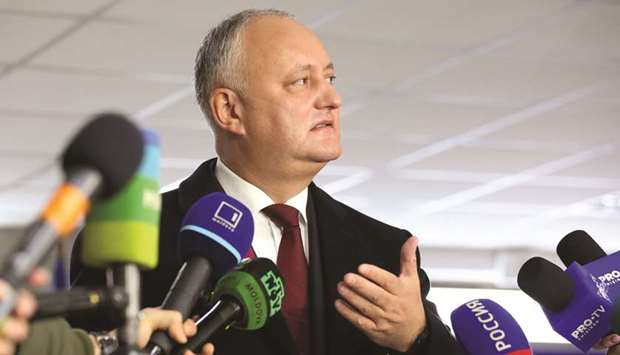Moldovans voted yesterday in the second round of a tightly contested presidential election pitting a pro-European challenger against the country’s Moscow-backed incumbent.
The ex-Soviet nation is under the watchful eye of Russia, which wants polarised Moldova to remain in its sphere of influence at a time when several Kremlin-aligned governments are rocked by political unrest.
In the first round vote earlier this month, pro-European Maia Sandu – a 48-year-old centre-right politician – won a surprise victory.
Sandu, who worked for the World Bank and briefly served as prime minister, won more than 36% of the vote against pro-Russian incumbent Igor Dodon’s 33%.
“Today, you have the power to punish those who robbed you, who reduced you to misery and forced you to leave your home,” Sandu said after voting in the capital Chisinau, in a clear allusion to her rival who has been targeted by accusations of corruption.
The appeal has resonance in one of Europe’s poorest countries where as many as 40% of citizens are estimated to have travelled abroad to work.
Sandu also called for “maximum vigilance” against possible fraud.
Dodon, meanwhile, said he “voted for peace”, “social justice” and “Christian values”.
“We must maintain good relations with the European Union and with Russia,” he said.
Caught off guard by the electoral setback in the first round, Dodon urged his supporters at a rally on Friday to vote and take to the streets after yesterday’s ballot to “protect our victory”.
The Kremlin-backed candidate, reportedly aided by Russian advisers, has stepped up rhetoric against Sandu.
“If we show weakness, we will lose our country,” Dodon said at the rally.
Sandu, who heads the Party of Action and Solidarity has promised to wage a fight against endemic corruption in the country of some 3.5mn wedged between Ukraine and EU member Romania.
Moldova has been rocked by multiple political crises and a $1bn bank fraud scheme equivalent to nearly 15% of annual economic output.
Polls published in the run-up to yesterday’s vote showed the two candidates in a tight race that could be decided by the diaspora, which local media reported had turned up in large numbers, forming long lines at polling stations in around a dozen European countries.
More than 200,000 Moldovans living overseas had voted by the early evening, compared to a total of 150,000 in the first round.
In the village of Varnita, police clashed with pro-Sandu protesters who had tried to block a road to prevent voters travelling from the nearby breakaway Moscow-backed region of Transnistria.
“Let it not get even worse,” said Vladimir Andriouchko, a 70-year-old who travelled from Transnistria, where Russian troops support separatists.
“One is doing their best for Russia, the other for Nato, so there is a bloodbath here,” he told AFP while in a long line to vote in Varnita.
While those from Transnistria were expected to largely vote for Dodon, five of the six voters AFP spoke to in Chisinau said they cast their ballot for Sandu.
Russia, faced with multiple protest movements this year targeting allies in Belarus and Kyrgyzstan, will be watching the vote closely.
Last month Russian President Vladimir Putin called on Moldovans to cast their votes for Dodon, and there were long lines at polling booths in Moscow yesterday.

Dodon speaks to the media at a polling station in Chisinau during the second round of a presidential election.
